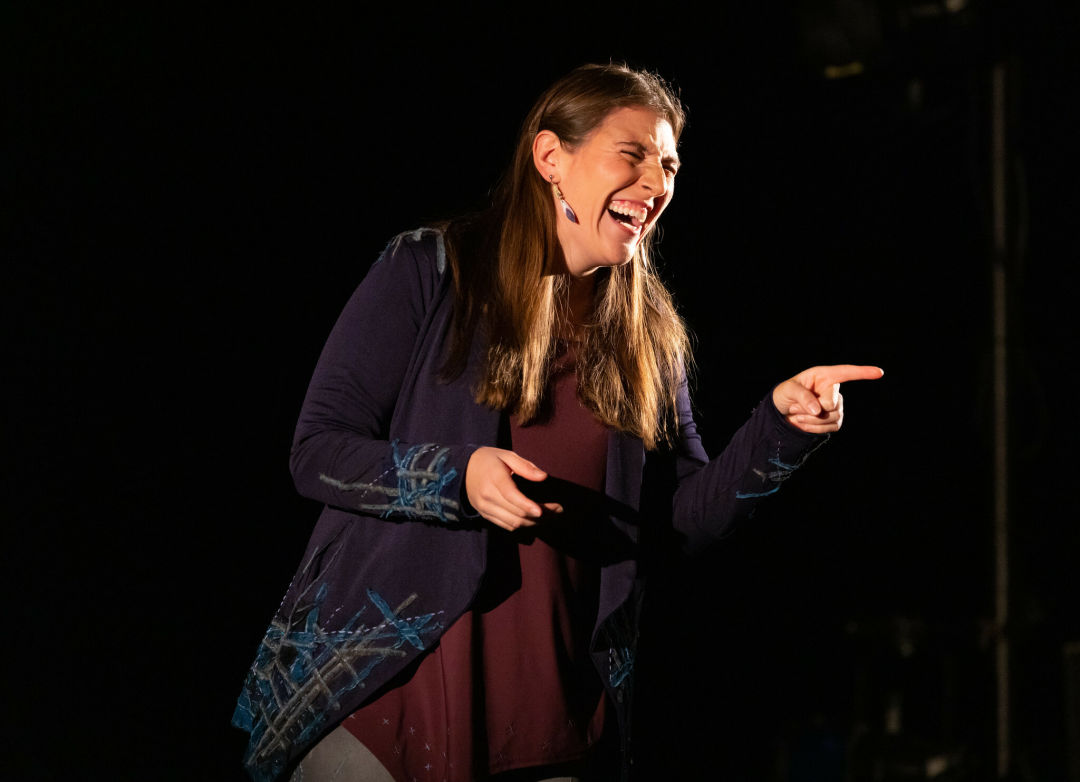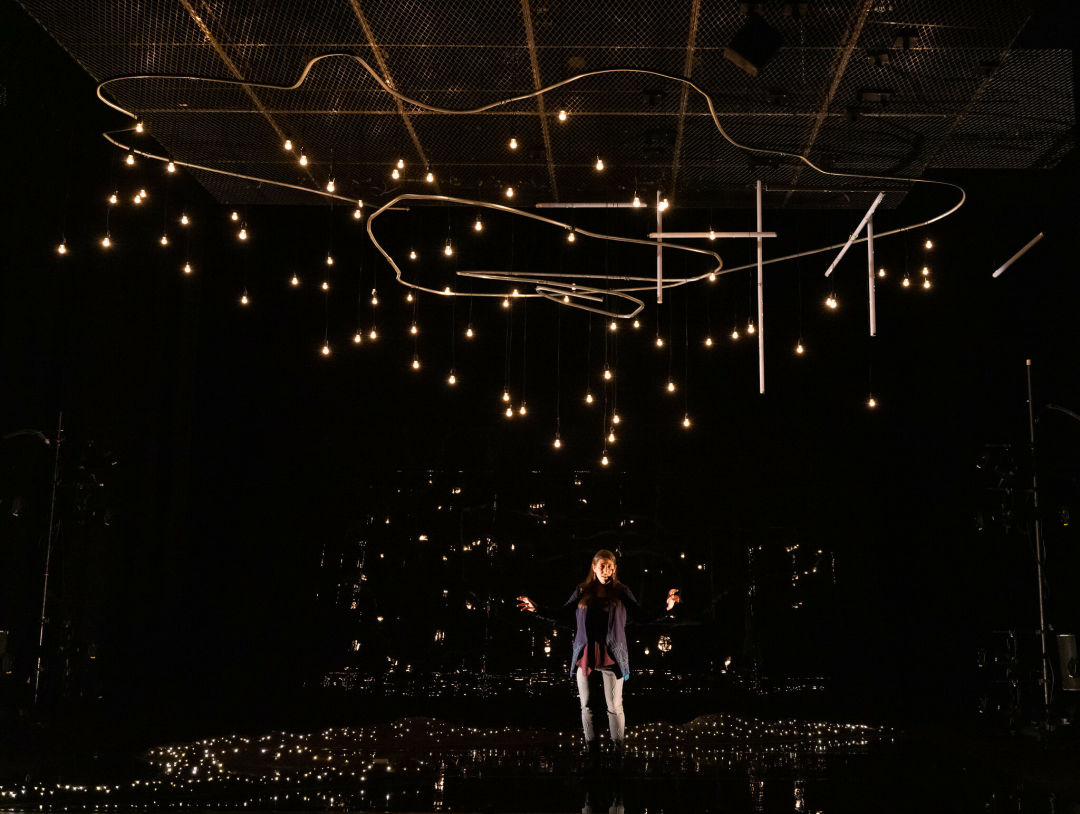'Where We Belong' at Portland Center Stage Grapples with Identity, Colonialism, and Shakespeare

Playwright Madeline Sayet in Where We Belong at Philadelphia Theatre Company, directed by Mei Ann Teo. For the Portland Center Stage production, Indigenous actor Jessica Ranville will make her debut performing the role of Achokayis.
Image: Mark Garvin
When Madeline Sayet returned from the U.K. in 2018—after crossing the Atlantic a few years before to pursue a PhD in Shakespeare at the time of the Brexit campaign—she felt unmoored, like her “feet didn’t quite root to the ground anymore,” she says. “And as a Mohegan person, I found that incredibly disturbing.”
So, the theatermaker began writing to make sense of what she was going through—of what it means to become a bird, as Sayet puts it.
In her autobiographical solo show Where We Belong, which opens on March 3 at Portland Center Stage in partnership with Woolly Mammoth Theatre Company and the Folger Shakespeare Library, Sayet recounts transforming from a wolf, who is “very grounded to a place and community,” into a bird as she travels across geographic borders.
“Everywhere I traveled, I would see things from just a little bit farther away,” Sayet says. “And so, I started to think about it through the lens of my Mohegan name [Achokayis], which means Blackbird.”
When she wrote Where We Belong, Sayet says she never saw it as a play. “I was always thinking of it as oral tradition, where it wasn’t designed to have this linear path. These are my stories, and this is how I pieced them together culturally and spiritually. I was telling parts of it, but also my ancestors were always there with me telling it.”
Sayet says she tried to process her journey through that of her Mohegan ancestors who traveled to England on diplomatic missions in the 1700s. “They weren’t able to come back home afterwards. And so, I thought, ‘Well, what happened to them?’”
The play reckons with colonialism, cultural genocide, and the loss of language, as well as Shakespeare’s role in colonization. Since she was a kid, Sayet has held a deep love of Shakespeare. But she’s critical of Shakespeare, too, particularly the way the English playwright is treated with such reverence by American society. Shakespeare is the only author required in the American Common Core State Standards, Sayet notes. “But there are no Indigenous authors that are required to be taught like that.”
Shakespeare’s prevalence is by no means an accident. “The reason I could perform Shakespeare anywhere growing up and I couldn’t learn my own language is because of colonialism,” Sayet says.
"It's not like I hate Shakespeare,” she adds. Sayet continues to engage with Shakespeare while also interrogating the way his work takes up space at the cost of other stories. “Why does American society lift Shakespeare up on this pedestal while it’s historically made it illegal to practice Indigenous art and to speak our own languages?” she says.
Sayet first performed Where We Belong at Shakespeare’s Globe in London in 2019 as part of Border Crossings’ ORIGINS Festival, the U.K.’s only large-scale multidisciplinary festival of Indigenous arts and culture.

Playwright Madeline Sayet in Where We Belong at Philadelphia Theatre Company.
Image: Mark Garvin
The play went on to become a national tour. Sayet has performed her life story more than 130 times—an experience that she says became too much as she relived her trauma every time she walked on stage. “It’s a lot psychologically to go through something that is actually your own experience that many times. I was like, ‘I need a break.’”
The play’s run at PCS is the first time that another actor will perform the role of Achokayis. Indigenous actor Jessica Ranville, who is making their PCS debut, is stepping into the role.
Director Mei Ann Teo, who started working with Sayet on Where We Belong in 2019, says that they’ve heard this story many times over the years, but they learn something new every time. “Now that I’m stepping in here with Jessica, I’m finding truths and insights and reckonings in the text for myself and for the world we live in every single day of rehearsal,” Teo says.
The rehearsal process for the show at PCS began with a five-day online workshop, Sayet says, and it has lasted only a couple of weeks. “A lot of it has been tablework and helping the actor understand what different things mean. It's pretty fast and furious. It's a lot for someone to take on.”
Sayet has been “in and out of the room” over the course of rehearsals; it’s an experience that she describes as “disorienting” as another actor tells her story. “I’m trying to frame it as much as possible as being a character right now,” she says.
Sayet always knew there would be a point in the tour where she wouldn’t be able to keep performing, she says. “Part of the reason I kept doing it was because I received so many notes from other Native folks over the course of the tour telling me how much they appreciated that I was doing it.”
Before the show embarked on its national tour, Sayet says her biggest fear was that her story would be displacing local Native stories. She also didn’t want it to be used “as a tokenistic way for theaters to check boxes, without actually changing their behavior.” So, she developed an accountability rider to go with it.
Presenting theaters must commit to a series of demands, including never presenting redface again, developing an ongoing relationship with the Native communities whose lands they occupy, and offering free tickets to all Native audiences.
"It is my hope that these initiatives will lead to more stories being told, and, when done in tandem with the show, create awareness of some of the actual issues the piece is trying to address,” Sayet says.
Though the show “is dealing with Mohegan culture in the far Northeast that is isn't interacting in a literal way with everybody’s lives [in Portland],” Sayet says she hopes that by hearing her story, audiences will “question the world around them, question why borders are made, and why we divide each other.”
7:30 p.m. Wed–Sun & 5 p.m. Sat & Sun, through March 26 |Portland Center Stage, $25–93, complimentary tickets are available to Indigenous audiences and can be reserved by contacting the PCS Box Office at 503-445-3700 or [email protected]
During the show’s run, Portland Center Stage will be hosting events featuring local Indigenous artists, including:
March First Thursday with DJ Gila Suspectum, DJ Lapaushi, an Indigenous marketplace, and more, 5–7 p.m. Thu, March 3, FREE
Anthony Hudson Author Talk and Reading from Looking for Tiger Lily, 6:30–7:15 p.m. Thu, March 9, FREE
The People’s Party: BIPOC Affinity Night for Where We Belong, 7:30 p.m. Sat, March 25, sliding scale tickets start at $25




